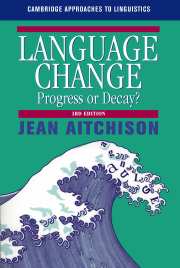Book contents
- Frontmatter
- Contents
- Preface
- Part 1 Preliminaries
- Part 2 Transition
- 4 Spreading the word
- 5 Conflicting loyalties
- 6 Catching on and taking off
- 7 Caught in the web
- 8 The wheels of language
- 9 Spinning away
- Part 3 Causation
- Part 4 Beginnings and endings
- Symbols and technical terms
- Notes and suggestions for further reading
- References
- Acknowledgments
- Index
6 - Catching on and taking off
How sound changes spread through a language
from Part 2 - Transition
- Frontmatter
- Contents
- Preface
- Part 1 Preliminaries
- Part 2 Transition
- 4 Spreading the word
- 5 Conflicting loyalties
- 6 Catching on and taking off
- 7 Caught in the web
- 8 The wheels of language
- 9 Spinning away
- Part 3 Causation
- Part 4 Beginnings and endings
- Symbols and technical terms
- Notes and suggestions for further reading
- References
- Acknowledgments
- Index
Summary
Large streams from little fountains flow,
Tall oaks from little acorns grow.
David Everett, Lines written for a school declamationLanguage change spreads in two ways: outwardly through a community, and inwardly through a language. Let us now consider this inner linguistic burrowing. Like a seed, any change is likely to have small beginnings. But if it puts down firm roots, it can develop into a massive growth which affects the whole landscape. This spreading process is the topic of this and the next chapter. This chapter will deal with sound change, and the following with syntactic change.
Just as a seed is likely to enter the ground where the soil is soft, such as a crack between paving stones, so a sound change is likely to creep into a language at a vulnerable point. In the words of Edward Sapir, a sound change is a ‘consummated drift that sets in at a psychologically exposed point and worms its way through a gamut of psychologically analogous forms’. We need to know what is meant by ‘a psychologically exposed point’, and how it ‘worms its way through’.
Until relatively recently, this was a question neglected by the majority of linguists, who did not realize that anything needed explaining. It was widely assumed that a sound change affected all the relevant words in a dialect simultaneously.
- Type
- Chapter
- Information
- Language ChangeProgress or Decay?, pp. 84 - 97Publisher: Cambridge University PressPrint publication year: 2000

